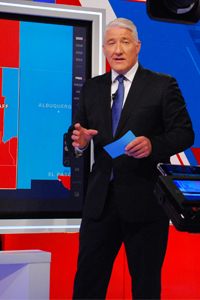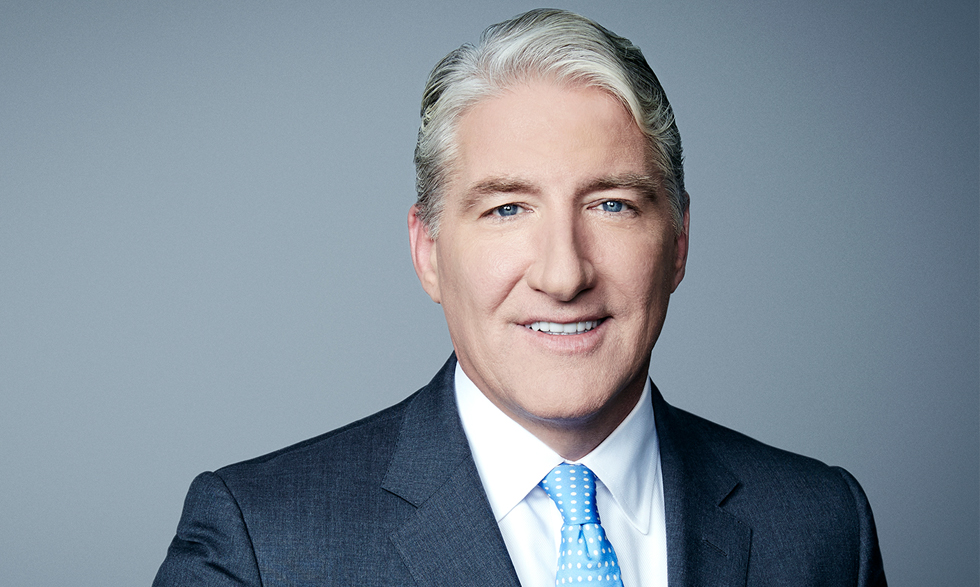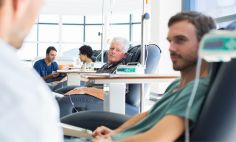CNN host John King has covered American politics for decades. Millions of Americans have tuned in to watch him provide poll updates via a high-tech U.S. map on election nights. Recently, King shared the personal news that he’s living with multiple sclerosis (MS), a chronic disease that affects the central nervous system. King talked to NIH MedlinePlus magazine about his MS journey and why he decided to speak out 13 years after his diagnosis.
How did you discover you had MS?
It’s now clear I was experiencing MS symptoms for a decade before my diagnosis. They were mostly in my legs—numbness, tingling, the feeling my legs were heavy like lead or nonresponsive. Every now and then I would drop things or have trouble with my grip. But I always wrote this off as inattention or fatigue or random stupidity. Also, doctors thought early on these issues were possibly related to damage I have in a couple discs in my low back.
While covering a presidential convention in the summer of 2008, I had numbness and loss of control that spread to my hands and most of my upper body. A paramedic at the convention site pulled me aside and said, “My bet is you have MS.” It took me a while to get all of the proper testing, but late that fall I finally had a series of tests that confirmed I have MS.
What was going through your head when you received the MS diagnosis?
I was full of fear when I heard the words multiple sclerosis, even more so when I read about it and realized how cruel this disease is to many people. But my doctors were reassuring from the beginning. Because we knew some of my symptoms dated back a decade before diagnosis, they were fairly optimistic I had the “relapsing-remitting” type of MS. While there were no guarantees, the hope was that with medication, this form of MS could be managed.
How are you doing now?
The “how are you” question is always a funny one. I’m great and I know I’m lucky, but MS is with me every day. I haven’t had full sensation in my legs since Bill Clinton was president. Recently, my right side and especially my right hand are having issues. I fall sometimes. Some days, every waking moment has to be planned. I have to think about and focus on things that for most are second nature—things like standing up or holding the coffee mug. Do I need the railing on the stairs? Are there headaches, and how bad are they? But I have learned how to snowboard even though I can’t really feel my feet. And just once in 13 years since diagnosis have I had to miss a day of work because of MS.
What led you to speak out?
I kept my diagnosis secret from most people for 13 years and had no plans to speak out. But mounting frustration with some of the country’s COVID-19 conversations pushed me over the line. The medications I take to treat my MS compromise my immune system, so I’m at higher risk from COVID-19. I allowed CNN’s medical experts to deal with the “freedom” versus “science” debate about wearing masks, but this was obviously an issue I was thinking about a lot because of my MS. One day, our conversation on the air included a particularly outrageous statement from a media personality about wearing masks, and I just talked about my MS diagnosis on the fly. I said I wanted to share this personal information because I was grateful for those who get vaccinated and wear a mask. They are not only protecting themselves; they are protecting me and so many others around them.

John King
What is your message for others who are dealing with MS?
Remember the gifts we get from the challenges. Many days are frustrating or worse. But the human brain and body are remarkable in how they adapt to the fight. The resilience and tenacity it takes to fight MS are great skills for other challenges.
What do you want others to know about MS?
One thing MS quickly teaches you is that there are so many things that are invisible to us. If you have a friend or family member with MS, please know there are things you can’t see and things that these loved ones might not want to share all the time. This can cause tension in relationships, which is another giant piece of the challenge.
For others who don’t have any direct experience with MS, please know that some of the things that come easy to you might be really hard for the person at the next desk or the stranger in front of you in line who maybe isn’t moving as quickly as you would like. Everyone has challenges. Remember some are invisible.
Is there anything else you’d like to share with our magazine’s readership?
First and foremost, I would like to share a giant thank you to the scientists and other professionals on the front lines of the COVID-19 pandemic. As a journalist, you have helped me learn. As a parent, you have fought to help those I hold most dear.
I would also pose a challenge of sorts. Debates about vaccines and mandates are the American way, and we should welcome and cherish them. But the explosion of misinformation, disinformation, and conspiracy are a threat to public health and public support for critical work. So we need to think about how we communicate and how we get our feet on the ground where these things take root.







